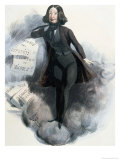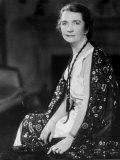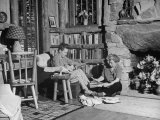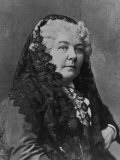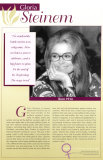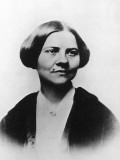|
|
Edith Spurlock Sampson
b. 10-13-1901?; Pittsburgh, PA
d. 10-8-1979
Edith Spurlock Sampson, a social worker, lawyer and judge, was the first African-American appointed to represent the U.S. at the United Nations and to NATO. She served both Presidents Truman and Eisenhower, and at a high school career day in Houston inspired a young Barbara Jordan to become a lawyer.
Edith Spurlock Sampson quotes ~
• “The question is, quite bluntly, ‘Do Negroes have equal rights in America?’ My answer is no, we do not have equal rights in all parts of the United States. But let's remember that 85 years ago Negroes in America were slaves and were 100 per cent illiterate. And the record shows that the Negro has advanced further in this period than any similar group in the entire world. You here get considerable misinformation about American Negroes and hear little or nothing that is constructive.” 1951
|
|
|
|
George Sand
b. 7-1-1804; Paris, France
d. 6-8-1876; Nohant, near Châteauroux
George Sand was the pseudonym of the French novelist and feminist Amantine-Lucile-Aurore Dupin, Baroness Dudevant. She began wearing men's clothing because they wore longer and were less expensive than an aristocrat's dress, as well as enabled her to gain access to places in Paris that might have been denied to a woman of her social standing. She was a companion to Frederic Chopin, friends with Franz Liszt, Gustave Flaubert, and actress Marie Dorval.
George Sand quotes ~
• “There is only one happiness in this life, to love and be loved.”
• “One approaches the journey's end. But the end is a goal, not a catastrophe.”
• “The artist vocation is to send light into the human heart.”
• “The trade of authorship is a violent, and indestructible obsession.”
• Story of My Life: The Autobiography of George Sand
|
|
|
|
Margaret Sanger, née Higgins
b. 9-14-1879; Corning, NY
b. 9-6-1966; Arizona
Nurse Margaret Sanger was a birth control activist who gradually won support for a woman to decide how and when she would have children. She was the founder of the American Birth Control League which eventually became Planned Parenthood.
FYI - Margaret, who was the 6th child of 11 live births, spent her childhood caring for the household and siblings. Her mother, Anne Purcell Higgins, was a devout Catholic who went through 18 pregnancies before dying of tuberculosis and cervical cancer.
Margaret Sanger quotes ~
• “No woman can call herself free who does not own and control her body. No woman can call herself free until she can choose consciously whether she will or will not be a mother.”
• “When motherhood becomes the fruit of a deep yearning, not the result of ignorance or accident, its children will become the foundation of a new race.”
• reproductive system posters
• Roe v Wade Supreme Court poster
• The Autobiography of Margaret Sanger
|
|
|
|
Saint Elizabeth Ann Bayley Seton
b. 8-28-1774; New York City, NY
b. 1-4-1821; Emmitsburg, Maryland
Mother Seton, the first native-born citizen of the United States to be canonized by the Roman Catholic Church (1975), converted to catholicism in 1805 while in Italy.
She establish the Sisters of Charity of St. Joseph in Emmitsburg, Maryland dedicated to the care of the children of the poor in 1810. It was the first religious community of apostolic women founded in the United States, and its school was the first free school in America.
The Mother Seton House at Baltimore, Maryland was listed on the National Register of Historic Places in 1972.
Mother Seton quotes ~
• “We must pray without ceasing, in every occurrence and employment of our lives - that prayer which is rather a habit of lifting up the heart to God as in a constant communication with Him.”
• “The first end I propose in our daily work is to do the will of God; secondly, to do it in the manner he wills it; and thirdly to do it because it is his will.”
• Mother Seton and the Sisters of Charity
• theology posters
|
|
|
|
|
|
|
Anna Howard Shaw
b. 2-14-1847; Newcastle-on-Tyne, England
b. 7-2-1919; Moylan, PA (pneumonia)
“Nothing bigger can come to a human being than to love a great cause more than life itself.”
Anna Howard Shaw was brought up near Big Rapids, Michigan when it was considered frontier, giving her first sermon in Ashton (1870). She attended Albion College and Boston University School of Theology, becoming the first female ordained as a Methodist minister. She also earned a Medical Doctor (MD) degree in 1886 though she never practiced medicine.
She was associated with the suffrage and temperance movements, being president of the National American Women’s Suffrage Association for ten years, and close friends with Susan B. Anthony. She was also the first woman awarded a Distinguished Service Medal, voted for by the United States Congress for her humanitarian work during World War I.
• The Story of a Pioneer
|
|
|
|
May Sinclair, née Mary Amelia St. Clair
b. 8-24-1862; Rock Ferry, Cheshire, England
d. 11-14-1946; Parkinson's Disease
Suffragist May Sinclair was the pseudonym of Mary Amelia St. Clair, a popular writer of about two dozen novels, short stories, poetry and critiques. The literary term ‘stream of consciousness’ is attributed to her.
In World War I she volunteered for an ambulance corps and suffered from shell shock.
May Sinclair quotes ~
• “The War will leave none of us as it found us.”
• “At the moment you are no longer an observing, reflecting being; you have ceased to be aware of yourself; you exist only in that quiet, steady thrill that is so unlike any excitement that you have ever known.”
• The Divine Fire
• May Sinclair: A Modern Victorian
|
|
|
|
Lillian Smith
b. 12-12-1897; Jasper, FL
d. 9-28-1966
Social critic and activist Lillian Smith is best remembered for her best-selling 1944 novel Strange Fruit. Smith, Southern born and raised, openly supported unpopular stances on the issues of race and gender equality, calling for the removal of Jim Crow laws. Lillian Smith was also a teacher, the director of the family owned girl's summer camp, and publisher with long time companion Paula Snelling of the literary magazine South Today.
Lillian Smith quotes ~
• “Rich folks always talk hard times.”
• “Faith and doubt both are needed - not as antagonists, but working side by side to take us around the unknown curve.”
|
|
|
|
Elizabeth Cady Stanton
b. 11-12-1815; Johnstown, NY
d. 10-26-1902; NYC, NY
“Let woman live as she should. ...Let her know that her spirit is fitted for as high a sphere as man’s, and that her soul requires food as pure and exalted as his.”
One of the most famous leaders of the women's rights movement, Elizabeth Cady Stanton spent much of her life working to improve women's place in society. Intelligent and strong-willed, Stanton was a fluent writer and a powerful public speaker. In 1848, she and Lucretia Mott organized the first women's rights convention. It was held in Stanton's hometown: Seneca Falls, New York. Stanton wrote a “Declaration of Sentiment” for the meeting. Based on the Declaration of Independence, this document called for women to be treated as men's equals. The most controversial point in the Declaration was the demand for women's suffrage, or women's right to vote. In 1851, Stanton met Susan B. Anthony. Two worked closely together and remained good friends for the rest of their lives. Their work was rewarded when the Married Women's Property law of 1860 was passed in New York. This law said a maried woman – not her husband – was in control of both her property and the money she earned. It became a model for similar laws in other states. In 1869, Stanton and Anthony broke from other women's rights activists and founded the National Woman Suffrage Association, with the goal of gaining the right to vote. From 1868 to 1870 they also published a newspaper called The Revolution. Stanton was the main writer and she used the paper to broadcast her strong views on women's rights. In 1890, Stanton and Anthony's group rejoined the other major women's organization and formed the National American Woman Suffrage Association. Stanton was the group's first president. Elizabeth Cady Stanton died in 1902 at age 86, 18 years before her dream of women's suffrage came true. Congress finally approved the 19th Amendment, guaranteeing women the right ot vote, in 1920. (text from a poster that is no longer available
• more Elizabeth Cady Stanton posters
|
|
|
|
Gloria Steinem
b. 3-25-1934; Toledo, OH
“No worthwhile battle can be won only once. Now we have a past to celebrate... and a big future to plan. It’s the end of the Beginning. The stage is set.”
Gloria Steinem is known around the world as one of the main leaders of the modern women's movement. An editor, writer, and activist, she has lead the fight for women's rights in all areas, from better jobs to increased political power. ...
• more Pioneer's of Women's Rights posters
|
|
|
|
Lucy Stone
b. 8-13-1818; West Brookfield, MA
b. 10-19-1893
Lucy Stone is remembered for keeping her birth name after marriage, and using it her entire life. She and her husband, abolitionist Henry Brown Blackwell (brother of Elizabeth Blackwell), were active in human rights throughout their lives. It was a Lucy Stone's speech that energized Susan B. Anthony to action in behalf of women's rights.
Lucy Stone quotes ~
• “A wife should no more take her husband's name than he should hers. My name is my identity and must not be lost.”
• “I think, with never-ending gratitude, that the young women of today do not and can never know at what price their right to free speech and to speak at all in public has been earned.”
|
|
|
|
Marie Carmichael Stopes
b. 10-15-1880; Edinburgh, Scotland
d. 10-2-1958; Dorking, Surrey, UK (breast cancer)
Author and palaeobotanist Marie Carmichael Stopes, D.Sc., Ph.D., was a pioneer for women's rights particularly in the field of family planning. Stopes also is remembered for her protests at places of worship.
|
|
|
|
Aung San Suu Kyi
b. 6-19-1945; Rangoon, Burma (officially the Union of Myanmar)
Aung San Suu Kyi, the daughter of Burmese national hero General Aung San, has been under house arrest for nearly fourteen of the last twenty years for her work of restoring democracy. Her philosophy is based on her Buddhist faith and influenced by Mahatma Gandhi. She was awarded the 1991 Nobel Peace Prize for her efforts on behalf of human rights in her country.
Aung San Suu Kyi quote ~
“It is not power that corrupts but fear. Fear of losing power corrupts those who wield it and fear of the scourge of power corrupts those who are subject to it.”
|
|
|
previous page | top | next
activist list | a | b | c | d | e | f | g | h | i-j | k | l | m | n-o | p | r | S | t-u-v | v-z >
Pioneers of Women’s Rights Movement Posters
|
|
I have searched the web for visual, text, and manipulative curriculum support materials - teaching posters, art prints, maps, charts, calendars, books and educational toys featuring famous people, places and events - to help teachers optimize their valuable time and budget.
Browsing the subject areas at NetPosterWorks.com is a learning experience where educators can plan context rich environments while comparing prices, special discounts, framing options and shipping from educational resources.
Thank you for starting your search for inspirational, motivational, and educational posters and learning materials at NetPosterWorks.com. If you need help please contact us.
|
|
|
|







